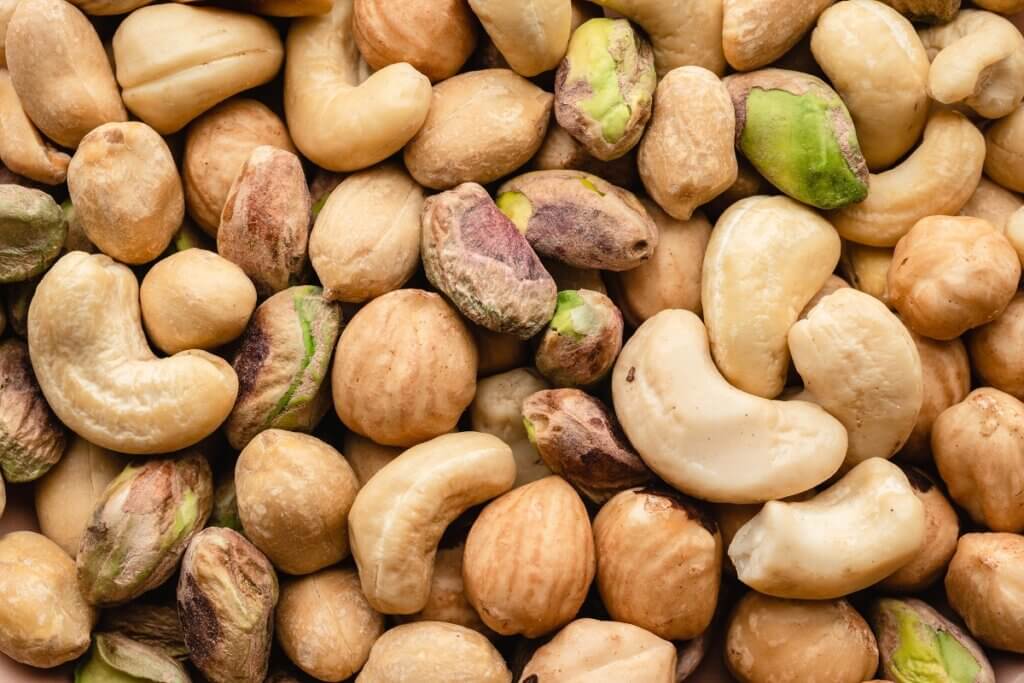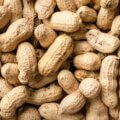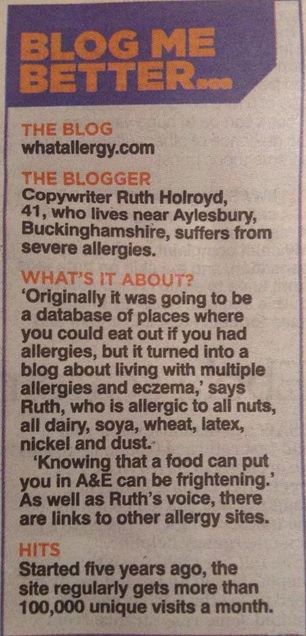There has been a flurry of news articles hearalding the end of peanut allergies, now wouldn’t that be something? And if scientists can change peanuts into safe tasty treats can they do this for other allergens?
You can read more in this Daily Mail article “GM peanuts could end danger to children”. Why the Daily Mail thinks only children will benefit from this is interesting. Just the usual headline grabbing sensationalism.
This really worries me though, will the new GM peanut really be completely allergy free? or just less likely to cause an allergic reaction? This is dangerous stuff to go playing around with.
What is a Genetically Modified Peanut?
Scientists claim they have managed to remove the allergy causing protein molecules from the peanut without altering it in any other way. Apparently in laboratory tests they have succeeded in altering the makeup of the peanut so it no longer triggers a life-threatening reaction.
A quote from the Daily Mail said, “The threat of peanut allergies could soon be wiped out by genetic engineering, scientists have revealed.”
Well I’ll believe it when I see it. I think this is very dangerous ground and will have to be testing extremely carefully before letting it loose on the world.

Would you try them?
If GM peanuts got mixed up with normal ones, how could you tell? Faced with a bowl of GM allergy free peanuts, would you be willing to take a handful and crunch away if you had a potentially life threatening allergy to them? Some people can have anaphylaxis just from being in the same room as peanuts so this just sounds terrifying. I certainly wouldn’t want to try these new GM peanuts. Just the smell of peanuts makes me feel sick. These are very bold claims, and I for one am not convinced.
A much more constructive use of time would be towards campaigning for restaurants and food manuafacturers to be far more aware of ALL allergens that they might use in their foods. Thousands of us allergy sufferers are excluded from enjoying every day foods and passtimes due to our fear of being exposed to allergens without our knowledge. They are hidden in all kinds of food stuffs.
Are they really safe?
The safe peanuts are part of a new generation of allergy-free food being produced by several international scientific teams. In Britain alone, the number of children developing potentially fatal allergies to nuts has trebled in the last decade. Almost one in every 30 children is now thought to suffer from peanut allergy, which can cause anthing from swelling of the tongue, wheezing and difficulty in breathing to a fatal anaphylactic attack; killing around ten people in this country each year.
Some experts blame the increase in peanut allergy on the number of women eating peanuts when they are pregnant and breastfeeding, which could sensitise their children. My mother ate peanuts when she was pregnant with me, my sister and brother, but only one of us has an allergy to them.
Scientists at the University of Arkansas, USA, are trying to use genetic engineering to modify specific proteins that give the peanut its allergenicity. They have so far succeeded in modifying the genes that produce two major peanut proteins so that they are no longer allergenic in lab tests.
So what’s next?
Several studies are also under way in America to create allergy-free prawns and soya beans. Interestingly these experiments have managed to remove up to 65% of allergenicity, so not quite all of it. This is probably no good whatsoever for those who are highly allergic, but may stop allergies developing in the first place, and will mean those with intolerances and mild reactions could see big improvements and a reduction of symptoms.
Can anything go wrong?
Some scientists and anti-gm lobbyists warn that messing with our foods vital and intricate make-up could cause problems to human health in the future, and effect our delicate eco-system of bugs, insects, birds, and so on up the food chain.
Cross contamination would also be a very real problem. The real organic allergy-full foods would look identical to their new GM allergen free cousins, so if there were any mistakes and crops/foods stuff got mixed up, the results could be potentially disasterous and life threatening.
The verdict?
I’m still not sure about GM allergen free peanuts, or any other foods for that matter. If scientists are successful we won’t see these products in our manufacturing processes, restaurants of supermarket shelves for years to come. With allergies on the increase and no real understanding about why this should be the case, could the new GM crops create a whole new type of problem and new allergies? We just don’t know. I for one am going to continue with my regime of avoidance of ALL allergens. NO GM crops for me.
I try to avoid genetically modified food stuffs anyway if I can and will always choose organic. What are your views on GM peanuts? Are they a good idea? Or are you, like me, feeling slightly uneasy about the whole thing? I’d love to hear from anyone, even some scientists who could perhaps allay some of my fears.
Now finally there is a test. Can you tell me which of the usual suspects in the picture above of the genetically modified peanut? and which are the real ones?
Photo by Marina Leonova from Pexels












I believe GM foods are if not fully then at least partially to blame for the increase in food allergies to begin with. It sounds like more of a profitable food product for major corporations then anything else. I agree, the risks are just too great!
Hi Trista. Thanks for your comment. It’s the long term effects on us and our environment of GM foods that worries me. Why bother when the real foods are just fine? I know it can help in developing countries to have crops that are more drought and pest resitent but on a widescale business it’s just not good. Not good at all. Could they in fact cause more allergies themselves? Who know whether they will be allergy free?
A peanut contains around 17 different proteins, so ‘GMing’ 2 of them won’t help I don’t think. And unless you could GM every peanut ever produced then it would be a Russian Roulette situation, and labelling and the whole processing chain would have to be perfectly, 100% protected from cross contamination. This hardly happens at all in the food industry now, so how it could be made effective for peanuts is a puzzle.
Hi Nicky. It’s frightening itn’t it. Cross contamination isn’t going to go away. We make mistakes here at home in our own kitchen. It happens all the time in restaurants and food manufacturing processes, like you say. A very dangerous and potentially life threatening and probably pointless exercise. Peanuts are also a very healthy food for most people. As a percentage it’s a tiny number of us with life threatening allergies. Do people who can eat peanuts want to eat GM ones? Do they care? And what’s most worrying is that you just wouldn’t be able to tell by looking at them – which is how I choose what to eat a lot of the time. Does it look safe? Does it smell safe? Do I trust the person telling me it’s OK? Well I guess the debate rolls on.
As you say, mistakes happen all the time and there will always be cross contamination in restaurants etc. However if we say eventually 50% of all peanuts are the new GM allergy free ones. That means 50% of the time a meal is cross contaminated with peanuts the eater with an allergy will be fine. 50% less deaths from peanut cross contamination. This can’t be a bad thing. Of course people like us should avoid all peanuts, GM or otherwise, but we should feel far safer eating on a day to day basis if GM peanuts displaced a significant proportion of traditional peanuts.
Hi Joe, thanks for the comment. When you put it like that maybe it is a good idea but there is a part of my brain screaming NOOOOOOOOOOOO… what I worry about is that these non allergenic peanuts will look exactly the same as the normal ones. There is so much room for error and who will know which is which once packaging has been disposed of or a dish is made. I guess for those who have a fatal reaction to peanuts, often without knowing they had such a bad allergy or an allergy at all, the GM peanuts could save lives. But for those with a diagnosed peanut allergy causing anaphylaxis the advice MUST continue to be, avoid ALL nuts, normal and GM because otherwise lives could be lost by mistakes. I wonder if this research is still going on and whether any GM peanuts are already on the market? I wrote this article years ago. Scary… not sure I’ll be reaching for the GM peanuts anytime soon. As someone with a peanut allergy they stink, I can smell a peanut from yards away, my peanut radar is bleeping in my ear and the taste… urgh. Makes me shudder. It would be horrible to eat anything that tasted of peanut, not enjoyable at all, but I suppose if these GM peanuts were used in confectionary production for instance, tiny traces found in chocolate would not cause a reaction. That tiny part of my brain is still screaming NOOOOOOOOOOOOOOOOOOOOOOO russian roulette.
There is the significant (and ironic) possibility that peanut allergies have escalated because of the deployment of other genetically altered crops. Since 1996 genes from different organisms, like bacteria and viruses, have been inserted into commodity food crops like soy, canola, corn and cottonseed.
There is no test to pre-determine safety vis-a-vis allergic reactions to these crops, but the crops do include novel proteins never before present in the food (or in the human gut). And it is proteins which commonly trigger immune responses/allergies. GM soy was introduced into the US food supply in1996, and is present in a huge array of processed food and snacks. From 1997-2002, peanut allergies doubled.
You could well be right Clifford. Did I really take over a year and half to reply? Must have missed your comment. Sorry! I think it’s a lot of things, also our gut microbiome which is affected by lots of things, repeated use of anti-biotics, caesaraen births etc.
Another interesting article about hypoallergenic cashews: http://www.npr.org/blogs/thesalt/2014/08/23/342534353/hypoallergenic-nuts-a-solution-to-nut-allergies